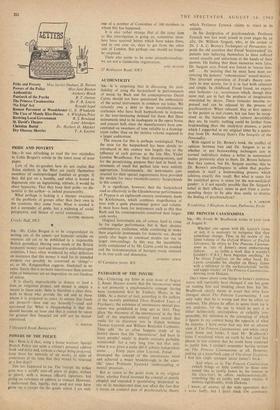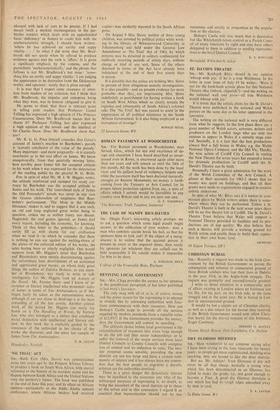THE PRINCESS CASAMASSIMA Sul,--Mr. Frank W. Bradbrook writes in your
issue of August 9:
Whether one agrees with Dr. Leavis's views or not, it is necessary to recognise that they sometimes' change. Thus, in his review of the latest volume of the Oxford History of English Literature, he refers to The Princess Casamas- sima as 'one of James's most embarrassing failures . . . so feeble a 'work that it wouldn't fcouldn't--F.R.L.; have begotten anything.' In The Great Tradition, on the other hand. Dr. Leavis concludes his chapter on Henry James with a reference to the uncharacteristic 'earthy and sappy vitality' Of The Princess Casamassima, deriving from Dickens.
One's views about some things in James's immense .antyre will inevitably have changed if one has gone on reading him and thinking about him; but Mr. Bradbrook clearly means to assert that mine have changed about The Princess Casamassima. I can only reply that he is wrong and that he offers no evidence. The phrase he offers to quote from me is not evidence, for the use to which he puts it is either deliberately unscrupulous or culpably irre- sponsible, the intention in the conveying of which it figures in any context being the opposite of what he imputes. I have never had any but an adverse view of The Princess Casamassima, and when, away from home and books, I read Mr. Bradbrook's letter I wondered where on earth he had read that phrase in any context that he could have supposed to justify him. I couldn't remember having written on The Princess Casamassima at all. However, picking up a paperback copy of The Great Tradition, I find this single sentence about James's book : And when, as in The Princess Casamassima (which brings so little comfort to those Who would like to justify James by his interest in the class-war), he offers, uncharacteristically, something like an earthy and sappy vitality. it derives, significantly, from Dickens.
I know, of course, of the wide agreement that I write badly, ,hut I don't think I'm commonly
charged with lack of care to be precise. If I had meant (with a marked inconsequence in the par- ticular context, which deals with an apprehended basic 'deficiency' in James) to credit him with the uncharacteristic strength, I should have written: 'where he has achieved an earthy and sappy vitality. . . In what I did write (but Mr. Brad- brook did not quote when he offered to produce evidence against me) the verb is 'offers.' It is given a significant emphasis by the comma, and the parenthetic 'uncharacteristically,' and the phrase that follows is not Mr. Bradbrook's but mine : 'some- thing like an earthy and sappy vitality.' I am judging the appearance to be derivative from the Dickensian reality, and specious : surely that is plain enough.
It is true that I expect some closeness of atten- tion from readers of my criticism, but I think that Mr. Bradbrook, his impulse and enterprise being what they were, was in honour obligated to give it.
He seems to think that there is relevant point in telling your readers that Professor Lionel Trilling has expressed a high opinion of The Princess Casamassima. Does Mr. Bradbrook means that he shares it? Professor Trilling has also expressed a high opinion of the novels and the intellect of Sir Charles Snow. Does Mr. Bradbrook share that. too?
Mr. R. G. G. Price himself concedes that Gosse's account of James's reaction to Beerbohm's parody is 'scarcely conclusive of the value of the parody.' More important—and more poignantly—it is scarcely conclusive as to the real effect on James. We know unequivocally, from that painfully moving letter, how terribly poor James felt the accepted *attitude to his work when it was expressed for the delectation of the reading public by the playful H. G. Wells.
For, in spite of what Mr. M. J. W. Higgins write.. the attitude reinforced and stamped for ready cur- rency by Beerbohm was the accepted attitude to James and his work. The 'convoluted style of James the Old Pretender's' novels was never in any case the fatuous elaboration of emptiness that Beer- bohm's performance, 'The Mote in the Middle Distance,' makes it, and to suggest that it was such, an old and long neglected great writer being in question, strikes me as neither funny nor decent. Neglected; the real genius ignored, as James had every reason, including the economic, for knowing. Think of that letter to the publishers—it should surely fill us with shame for our civilisation when we read it—in which he concedes that there is nothing he can say against the melting-down of the plates of the collected edition of his works, the sales having been so utterly negligible. One would suppose from Mr. Higgins's letter that Beerbohm and Bloomsbury were merely discriminating against the unfortunate later development of an acclaimed and appreciated great master, on whose truly great things the author of Zuleika Dobson, or any mem- ber of Blooinsbury, was ready to write or talk intelligently. Let Mr, Higgins look up Aspects of the Novel: Mr. Forster there—and I know of no reviewer or literary intellectual who protested—talks of James in terms of The Ambassadors, as if that might fairly be taken as the representative work, although (I am not alone in thinking) it is the least rewarding of all the late novels. Another critical work of the period Mr. Higgins can easily lay hands on is The Handling of Words, by Vernon Lee, who also belonged to a milieu that combined social distinction with intellectual and literary cul- ture. In that book she is explicitly guided by the consensus of the cultivated in her choice of the works she discusses, and sho takes her sample of James from 7'he Ambassadors.
F. R. LEAV1S































 Previous page
Previous page